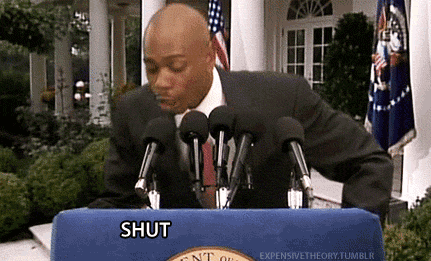Do Africans owe us reparations for selling us into slavery?
Options
A Talented One
Members Posts: 4,202 ✭✭✭
By 'us' I mean black Americans, West Indians and black Latin Americans.
Let's set aside their ability to pay; you can owe someone money even if you broke.
Let's set aside their ability to pay; you can owe someone money even if you broke.
Comments
-
Uh oh
-
No one owes anyone anything reparations are a pipe dream. Even asking for reparations while not in the political positions to take it is a sign of how weak the black race in america is
In other words stop crying. -
-
You been listening to too many cacs
-
Handouts are not a good look
-
WTF!!!
-
DevilsFavoriteClown wrote: »Handouts are not a good look
Who is talking about handouts? Would reparations from white Americans be a handout?
-
WTF!!!
If white people owe black people reparations for slavery, then arguably the people who sold our ancestors into slavery owe us reparations as well. -
A Talented One wrote: »DevilsFavoriteClown wrote: »Handouts are not a good look
Who is talking about handouts? Would reparations from white Americans be a handout?
Yes. -
Sigh....

-
-
A Talented One wrote: »DevilsFavoriteClown wrote: »Handouts are not a good look
Who is talking about handouts? Would reparations from white Americans be a handout?
Yes.
So people shouldn't pay for their misdeeds? -
Close This attention seeking thread
-
-
opportunity equality would be better...we still don't have that
-
Da Riddler wrote: »

Is he in blackface? -
I don't see what's so problematic about asking this question. Some Africans themselves recognize the wrongdoing of their ancestors.As part of a tourism campaign to attract descendents of African slaves around the world, Ghana is offering an apology for its role in the trans-Atlantic slave trade, which launched in part from Ghana’s Elmina Castle carrying Africans captured by fellow black Ghanaians.
According to The Washington Times, Ghana’s 50th anniversary of its independence includes an effort called "Project Joseph," which invites blacks to trace their history to the slave trade and reconnect with the land of their ancestors. An apology will be included as part of the experience.
"The reason why we wanted to do some formal thing is that we want -- even if it's just for the surface of it, for the cosmetic of it -- to be seen to be saying 'sorry' to those who feel very strongly and who we believe have distorted history, because they get the impression that it was people here who just took them and sold them," said Emmanuel Hagan, director of research and statistics at Ghana's Ministry of Tourism and Diasporean Relations.
"It's something we have to look straight in the face and try to address, because it exists. So we will want to say something went wrong. People made mistakes, but we are sorry for whatever happened."
While an estimated 17 million Africans were taken from the western coast of Africa to become slaves in the Americas, millions more died during overland marches to slave-trading forts such as Elmina, after being captured by fellow black Africans.
The idea that some Africans sold their own people into slavery has been downplayed by history books, but it’s a fact that Ghana has never tried to hide.
"Long before the coming of Europeans to the Guinea coast of Africa, our local people here already practiced slavery," Philip Amoa-Mensah, a volunteer guide at Elmina Castle, told the Times.
Emmanuel Hagan, director of research and statistics at Ghana's Ministry of Tourism and Diasporean Relations says sometimes a simple apology can go a long way.
"We have something we call the healing to take care of that aspect of the relationship, because we cannot gloss over it," Hagan told the Times. "We just want to say 'sorry,' let's back down, let's calm down. ... I think that if you say "sorry' to somebody, no matter how hard the feeling is, once you say 'sorry,' it mellows things."
http://www.modernghana.com/news/102821/1/ghana-apologizes-for-its-role-in-slave-trade-count.html -
A Talented One wrote: »DevilsFavoriteClown wrote: »Handouts are not a good look
Who is talking about handouts? Would reparations from white Americans be a handout?
Success is the best revenge. Those deeds are done. As a people, the opportunities are endless to rude in the ranks and take control of this country. Obama is living proof of that. A handout will only say we still need you. -
A Talented One wrote: »I don't see what's so problematic about asking this question. Some Africans themselves recognize the wrongdoing of their ancestors.As part of a tourism campaign to attract descendents of African slaves around the world, Ghana is offering an apology for its role in the trans-Atlantic slave trade, which launched in part from Ghana’s Elmina Castle carrying Africans captured by fellow black Ghanaians.
According to The Washington Times, Ghana’s 50th anniversary of its independence includes an effort called "Project Joseph," which invites blacks to trace their history to the slave trade and reconnect with the land of their ancestors. An apology will be included as part of the experience.
"The reason why we wanted to do some formal thing is that we want -- even if it's just for the surface of it, for the cosmetic of it -- to be seen to be saying 'sorry' to those who feel very strongly and who we believe have distorted history, because they get the impression that it was people here who just took them and sold them," said Emmanuel Hagan, director of research and statistics at Ghana's Ministry of Tourism and Diasporean Relations.
"It's something we have to look straight in the face and try to address, because it exists. So we will want to say something went wrong. People made mistakes, but we are sorry for whatever happened."
While an estimated 17 million Africans were taken from the western coast of Africa to become slaves in the Americas, millions more died during overland marches to slave-trading forts such as Elmina, after being captured by fellow black Africans.
The idea that some Africans sold their own people into slavery has been downplayed by history books, but it’s a fact that Ghana has never tried to hide.
"Long before the coming of Europeans to the Guinea coast of Africa, our local people here already practiced slavery," Philip Amoa-Mensah, a volunteer guide at Elmina Castle, told the Times.
Emmanuel Hagan, director of research and statistics at Ghana's Ministry of Tourism and Diasporean Relations says sometimes a simple apology can go a long way.
"We have something we call the healing to take care of that aspect of the relationship, because we cannot gloss over it," Hagan told the Times. "We just want to say 'sorry,' let's back down, let's calm down. ... I think that if you say "sorry' to somebody, no matter how hard the feeling is, once you say 'sorry,' it mellows things."
http://www.modernghana.com/news/102821/1/ghana-apologizes-for-its-role-in-slave-trade-count.html
Uuuuuuuh oooohhhhhh -
-
This has been discussed before.
It's Time to Face the Whole Truth About the Atlantic Slave Trade
http://hnn.us/article/41431
Mr. Stern taught African American history at the college level for a decade before becoming historian at the John F. Kennedy Library and Museum (1977–1999)—where he designed the museum’s first civil rights exhibit. He is the author of Averting ‘the Final Failure’: - See more at: http://hnn.us/article/41431#sthash.Za7GgkJN.dpuf
On June 21, 2007, the Freedom Schooner Amistad began an 18-month “Atlantic Freedom Tour” to retrace the route of the Atlantic slave trade. Owned and operated by AMISTAD America, Inc., the recreated Amistad will visit ports in Canada, England, the United States and West Africa to commemorate the story of the 1839 Amistad revolt and to mark the 200th anniversary of the abolition of the international slave trade in England (1807) and the U.S. (1808). - See more at: http://hnn.us/article/41431#sthash.Za7GgkJN.dpuf
Incomplete depictions of the Atlantic slave trade are, in fact, quite common. My 2003 study of 49 state U.S. history standards revealed that not one of these guides to classroom content even mentioned the key role of Africans in supplying the Atlantic slave trade.3 In Africa itself, however, the slave trade is remembered quite differently. Nigerians, for example, explicitly teach about their own role in the trade:
Where did the supply of slaves come from? First, the Portuguese themselves kidnapped some Africans. But the bulk of the supply came from the Nigerians. These Nigerian middlemen moved to the interior where they captured other Nigerians who belonged to other communities. The middlemen also purchased many of the slaves from the people in the interior . . . . Many Nigerian middlemen began to depend totally on the slave trade and neglected every other business and occupation. The result was that when the trade was abolished [by England in 1807] these Nigerians began to protest. As years went by and the trade collapsed such Nigerians lost their sources of income and became impoverished. 4
The historical record is incontrovertible—as documented in the PBS Africans in America series companion book:
The white man did not introduce slavery to Africa . . . . And by the fifteenth century, men with dark skin had become quite comfortable with the concept of man as property . . . . Long before the arrival of Europeans on West Africa’s coast, the two continents shared a common acceptance of slavery as an unavoidable and necessary—perhaps even desirable—fact of existence. The commerce between the two continents, as tragic as it would become, developed upon familiar territory. Slavery was not a twisted European manipulation, although Europe capitalized on a mutual understanding and greedily expanded the slave trade into what would become a horrific enterprise . . . . It was a thunder that had no sound. Tribe stalked tribe, and eventually more than 20 million Africans would be kidnapped in their own homeland. 10 -
? we are stolen africans. People ? me with this ? about we got sold no the ? we didn't that doesn't make sense. NOBODY IS WILLING TO SELL HIMSELF FOR ANY TYPE OF WRONGDOING EVERYTHING IS AGAINST YOUR WILL
-
The nations that were involved on the slave trade dont exost any more so where do you suppose these reparations come from
-
A Talented One wrote: »A Talented One wrote: »DevilsFavoriteClown wrote: »Handouts are not a good look
Who is talking about handouts? Would reparations from white Americans be a handout?
Yes.
So people shouldn't pay for their misdeeds?
only by force. we lack the power to force anything. so your way would only be begging.
and anyway it would only cause more harm than good on both parties -
Personally, I feel like there's a huge difference between an ethnic group (let's not pretend there was anything close to what's considered nigeria before the scramble for Africa) selling off their POW's (prisoner of war)
and
a nation of united ethnicities fully convinced of racial superiority hell bent on using African labor, because they're too superior to do it. I feel like there's a huge mental ramification that transcends generations hasn't really been elaborated on in my opinion....
For example, the difference between: "ok im a slave because we lost a war..." compared to: "ive been indoctrinated my whole life to believe I'm so inferior to these melanin deficient people that slavery is my only option"















